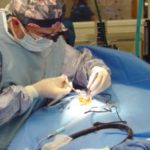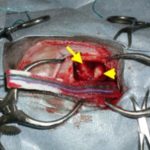Brain Surgery
As in people, brain surgery is performed for a variety of ailments, including surgical removal of brain tumors, correction of brain anomalies (e.g., Chiari malformation), removal of blood clots (e.g., subdural hematoma), and placement of shunts in patients with hydrocephalus. Brain surgery is performed most often by veterinary neurologists, but also by some veterinary surgeons.
The most common reason that brain surgery is performed in dogs & cats is to remove a brain tumor. In both dogs and cats, the most common brain tumor is a meningioma, a tumor of the membranes which surround & protect the brain & spinal cord.
While having your pet being diagnosed with a brain tumor is scary, it is important to know that animals generally do quite well with treatment. In general, animals tolerate brain surgery, radiation therapy, and chemotherapy MUCH better than people, with fewer side effects.
In cats, surgical removal of a meningioma can be curative. In dogs with meningioma, and in both dogs and cats with other brain tumors, brain surgery can provide patients with improved quality of life for much longer than medical treatment alone, especially when followed by radiation therapy.
- Dr. Mark Troxel performs brain surgery on a cat with a meningioma.
- Post-operative photo of a dog that had brain surgery to remove a meningioma.
- Intra-operative view of a meningioma (arrow) and normal brain (arrowhead). The cat’s nose is to the left.


